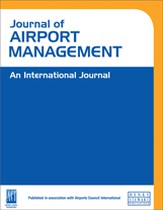An application of reliability analysis to taxi-out delay in the case of New York John F. Kennedy International Airport
Abstract
Improving the efficiency of ground surface movements is a key preoccupation for airline and airport operators. Taxi-out delays affect airlines’ on-time performance by increasing the time aircraft have to spend on the tarmac. This, in turn, is likely to strain available airport capacity and result in propagated delays throughout the National Airspace System. This paper utilises reliability analysis, also called survival analysis, to understand how the resilience of taxi-out delays is likely to generate airport congestion. This analysis is useful for aviation practitioners who are seeking to set an acceptable level of service at an airport given demand for service and available capacity.
The full article is available to subscribers to the journal.
Author's Biography
Tony Diana is the Acting Division Manager, Outreach at the US Federal Aviation Administration (FAA). He received his doctorate in policy analysis and quantitative management from the University of Maryland, Baltimore County. He is involved in the communication of progress in modernisation programmes at US airports, metroplexes and airspaces. Prior to that position, he was Division Manager, NextGen Performance in the Office of NextGen Performance and Outreach and Deputy Division Manager, Forecasting and Performance Analysis, in the Office of Aviation Policy and Plans of the FAA, where he managed the aviation system performance metrics data warehouse. At the Maryland Aviation Administration, he was involved in performance measurement and route development. Tony’s main interests are performance evaluation and benchmarking as well as the study of delay. He is a certified Lean Sigma Master Black Belt and a certified Project Management Professional.
